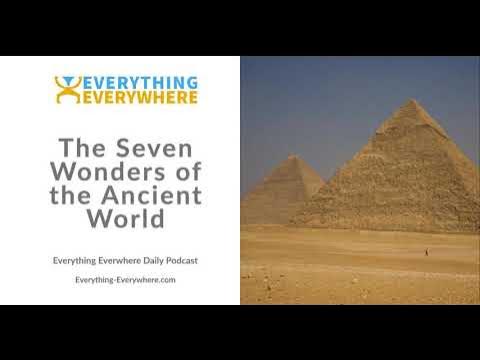The Ancient City of Babylon: History of the Babylonian Empire
Summary
TLDRThis video explores the ancient city of Babylon, once considered a wonder of the world, with its legendary walls and the possibly mythical Hanging Gardens. Narrated by Kelly, it delves into Babylon's historical significance, its rise under King Hammurabi with his famous law codes, and its eventual fall to the Persians. The video also contrasts the Bible's negative portrayal of Babylon with the admiration from other ancient sources, highlighting the city's cultural and architectural marvels.
Takeaways
- 🏛 Babylon was an ancient city in Mesopotamia, now modern-day Iraq, and was known as the 'Gate of the Gods'.
- 🌳 The Hanging Gardens of Babylon, one of the Seven Wonders of the Ancient World, may have never existed or possibly were located in Nineveh.
- 📜 Babylon's fame is partly due to its numerous biblical references, particularly in the books of Daniel, Jeremiah, Isaiah, and Revelation.
- 🏗 The city was transformed into a powerful center by King Hammurabi, who is famous for his law codes and contributions to the city's infrastructure.
- 🛡 Babylon was known for its impressive structures like the Ishtar Gate and its massive walls, which were said to be wide enough for chariots to race on top.
- 🔥 The city faced destruction and rebuilding multiple times, including by the Neo-Assyrian King Sennacherib, who scattered its ruins.
- 🌐 Babylon's cultural and architectural legacy was admired by ancient sources, in contrast to the Bible's negative portrayal.
- 👑 Nebuchadnezzar II, a Chaldean king, renovated Babylon and constructed some of its most famous buildings, including the possibly mythical Hanging Gardens.
- 🏰 Babylon continued to be a significant city under various rulers until it was conquered by Cyrus the Great in 539 BCE, leading to its eventual decline.
- 🗝️ The city's remains were lost for centuries until European travelers and archaeologists rediscovered them in the 17th and 18th centuries, sparking interest in Mesopotamian archaeology.
Q & A
What were the walls of Babylon once considered to be?
-The walls of Babylon were once considered one of the wonders of the world.
What is the alternative theory about the location of the Hanging Gardens of Babylon?
-Some scholars suggest that the Hanging Gardens may have actually been located in Nineveh instead of Babylon.
What does the name 'Babylon' mean in the context of the Acadians?
-In the context of the Acadians, 'Babylon' means 'gate of the gods'.
Which biblical books make references to Babylon?
-The biblical references to Babylon are primarily found in the books of Daniel, Jeremiah, Isaiah, and the Book of Revelation.
What is Hammurabi known for in the history of Babylon?
-Hammurabi is known for his law codes, which he spread throughout his empire, and for transforming Babylon into a powerful and influential city in Mesopotamia.
What happened to Babylon after Hammurabi's death?
-After Hammurabi's death, his empire fell apart, making it easy for the Hittites to sack Babylon in 1595 BCE.
Who was Nebuchadnezzar II and what is he known for?
-Nebuchadnezzar II was a Chaldean king who reigned from 605 to 562 BCE. He is known for renovating the city of Babylon and creating some of the most impressive buildings in Mesopotamia.
Why is the existence of the Hanging Gardens of Babylon questioned by some scholars?
-The existence of the Hanging Gardens of Babylon is questioned because their ruins have never been found, and some ancient sources suggest they may have been located elsewhere.
How did Cyrus the Great's approach to Babylon differ from that of the earlier conquerors?
-Cyrus the Great took the city without a fight, according to Persian accounts, and held Babylon in high esteem, making it one of the administrative capitals of his empire.
What is the significance of the Ishtar Gate in Babylonian history?
-The Ishtar Gate was a mammoth structure decorated with golden images and was often mentioned with reverence, symbolizing the grandeur of Babylon.
How did the city of Babylon decline and eventually disappear?
-Babylon gradually declined after the death of Alexander the Great in 323 BCE, and by the time of Parthian rule in 141 BCE, it had been deserted and forgotten. The city was eventually swept away during the Muslim conquest in 650 CE and buried beneath the sands.
Outlines

This section is available to paid users only. Please upgrade to access this part.
Upgrade NowMindmap

This section is available to paid users only. Please upgrade to access this part.
Upgrade NowKeywords

This section is available to paid users only. Please upgrade to access this part.
Upgrade NowHighlights

This section is available to paid users only. Please upgrade to access this part.
Upgrade NowTranscripts

This section is available to paid users only. Please upgrade to access this part.
Upgrade NowBrowse More Related Video
5.0 / 5 (0 votes)





